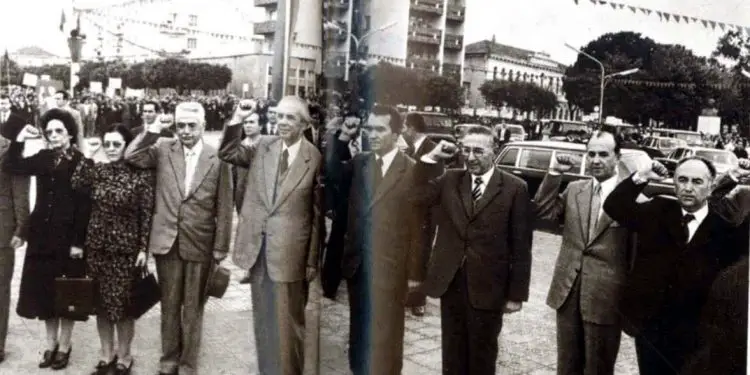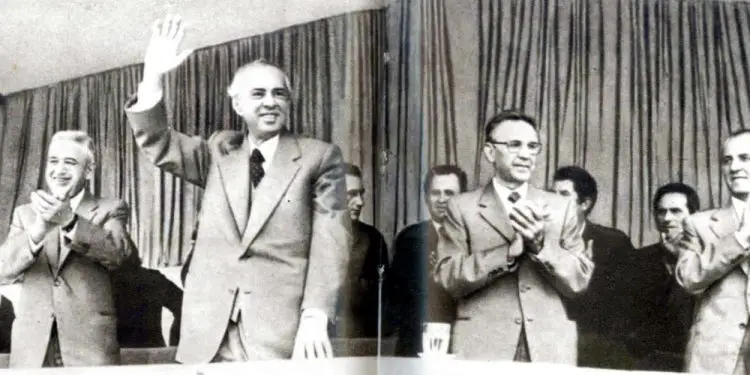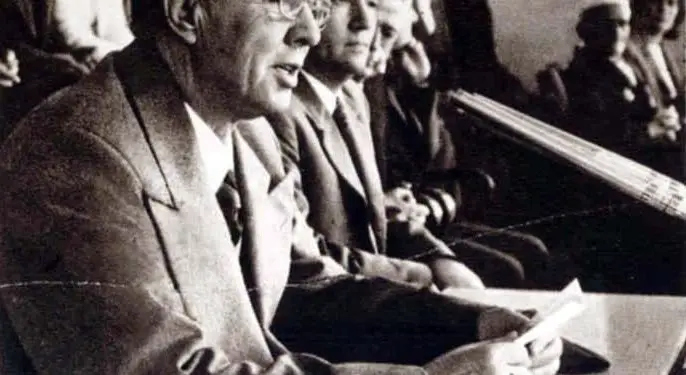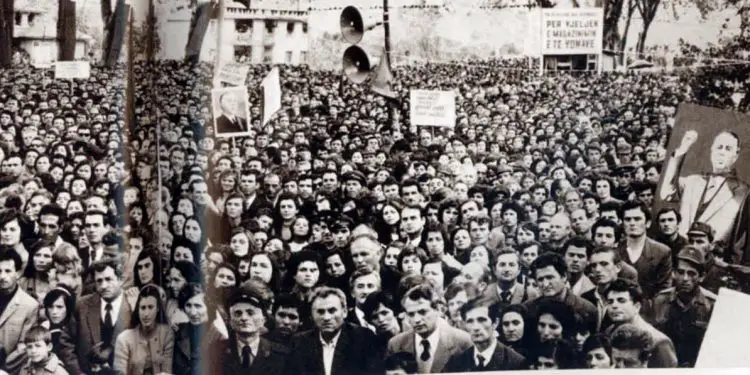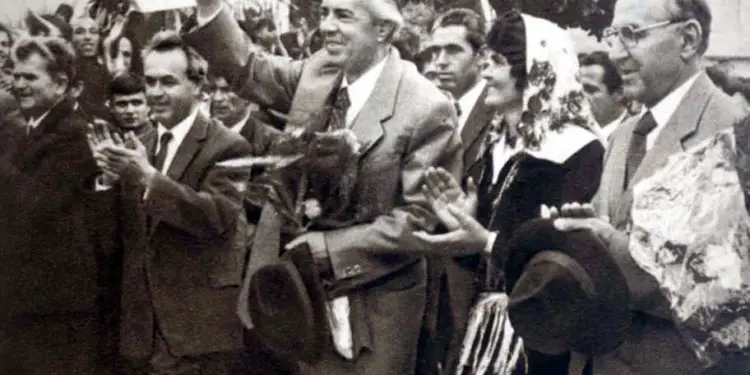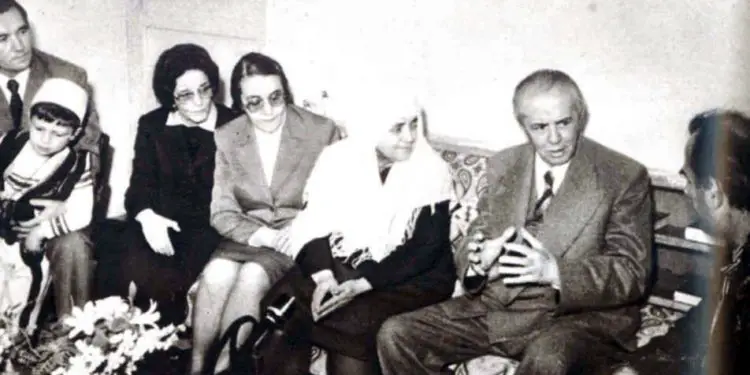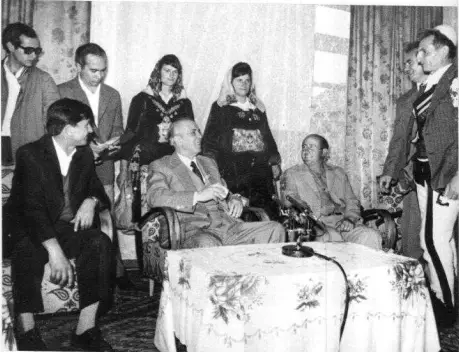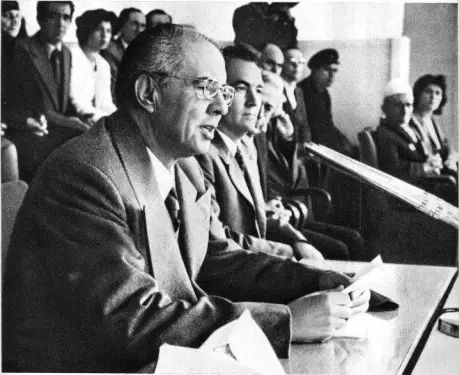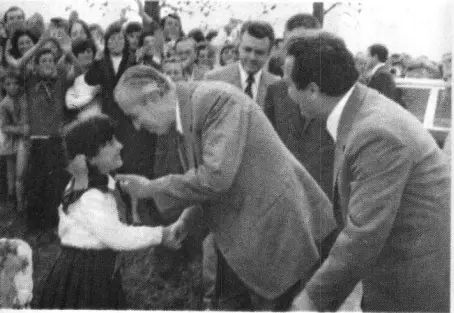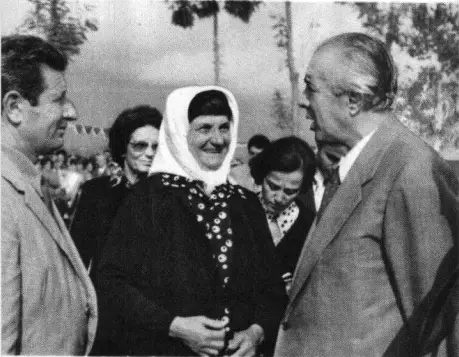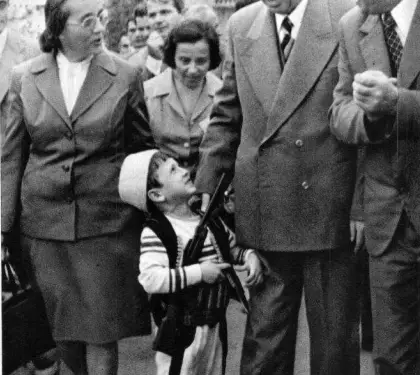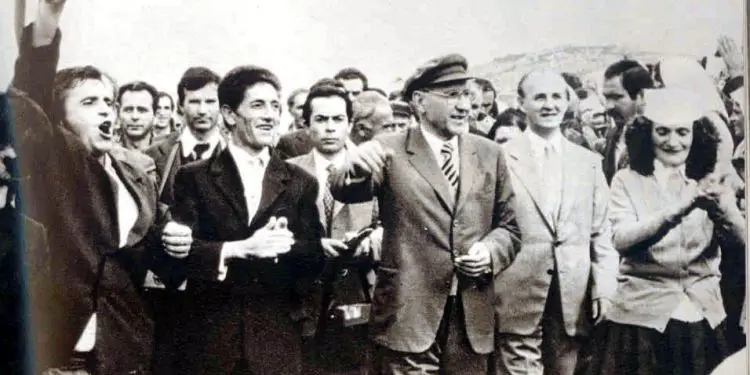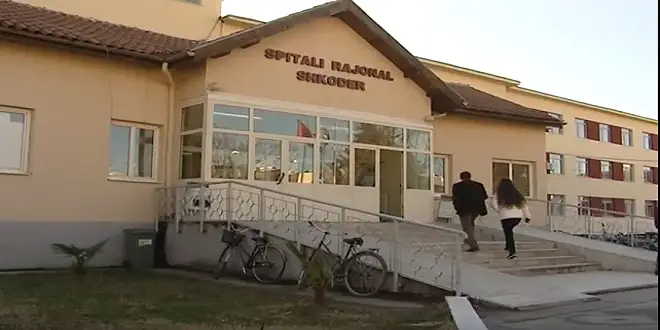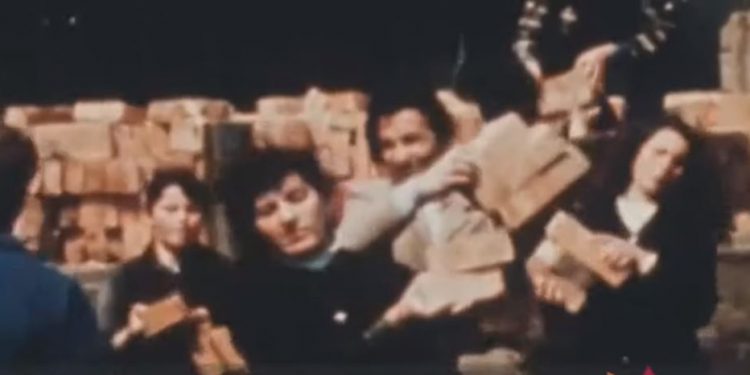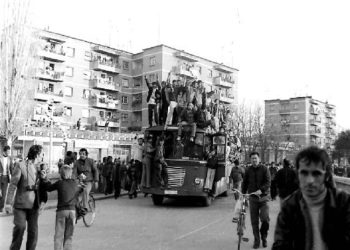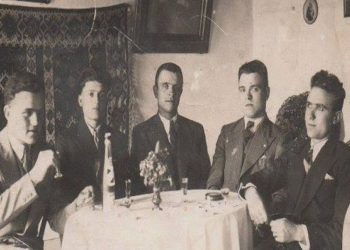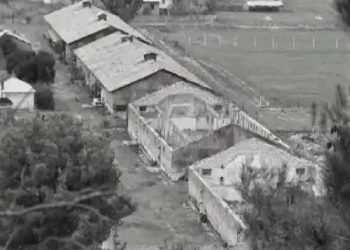Memorie.al publishes historical documents from the archive of the former Central Committee of the ALP with the minutes of Enver Hoxha’s daily meeting with the secretaries of the Central Committee, such as: Hysni Kapo, Ramiz Alia, Prokop Murra and Simon Stefani, held on on April 18, 1979, just three days after the strong earthquake that hit the districts of Lezha and Shkodra where 35 people lost their lives and there was significant material damage where hundreds of homes and social-cultural objects were destroyed or razed to the ground, mainly in the villages of Shkodra and Lezha. Enver Hoxha’s rare testimony regarding the treatment of injured people with fractures from the earthquake who needed irons placed on the broken bones and since they were not available in our hospitals as they were imported material, a sample was taken and requested from the Office of Vehicles in Shkodër, which produced 150 pieces within 24 hours and treated the wounded with them…
Continues from the previous issue
COMRADE HYSNI KAPO: I was impressed, Comrade Enver, by something else that Hekurani told me. Some enterprises, which are not in the oil sector, without abandoning their duties, will do all those things to speed up the work in the oil sector, such as, for example, opening the roads to the drilling points, etc. What does this show? Such a thing shows how many reserves these enterprises have and who should dispose of these reserves.
COMRADE ENVER HOXHA: It is very clear; there was a lack of direction. I have said it once again, the structure of the Oil and Gas Institute must be studied, to change and improve, that as it is now, it is not working well.
COMRADE PROKOP MURRA: Drilling points are not given in order; they go even 1 thousand meters deeper. So, it is given for a depth of 3 thousand meters and the drilling goes up to 4 thousand meters.
COMRADE ENVER HOXHA: But who justifies this? No one is responsible for these things? So the work is limping in some directions. No one does and does not study, for example, the biography of wells. In the institute or in the General Directorate of Oil, there should be a special sector to deal with this important issue. Even the institute itself should make it a working method to organize discussions, consultations, scientific debates for all the problems that arise, where opinions and experience can be exchanged between different sectors, then come up with conclusions. You can also see the organization of the institute, that there may be many people, but who don’t work well, who spend their time being lazy, etc. Maybe we should “prune” an organic part of this institute and keep those who are capable, conscientious people at work. I also think that the institute, its leaders and other employees should be held more accountable for the performance of certain tasks. Or stop and look at the organizational structure of the Institute of Studies and Designs no. 1 here in Tirana. The institutes for all the constructions of Albania have united them in a single one. This institute has also been entrusted with the designs for the constructions in the areas damaged by the earthquake. Will he be able to do all these tasks?! Why was this union made? We had it with two or three, we are told, and we combined it to reduce the organics. But actually, what was cut? Do you think for a moment that administration, accountants, financiers and others are also needed for the construction sites of large industrial facilities? As it is, we save the salary of ten layoffs, but lose millions. We must separate these institutes. I think the Institute for the design of industrial works should be separate. But even now the sector is separate, they can say. Yes, but everyone is connected to his director. Here, now projects will be made for entire cities. And where should the specialists of this institute come first? It is important to think deeply about this work, because we are building the country with our own strength, even the factory projects are now being done by ourselves. In these conditions, we must be realistic more than ever. Friends of the Government said that this is what we will do, we will study this issue. Study it, I told them, but let this work be done a little quickly, not take six or seven months. Why do I raise the issues of organics and not the ministers and deputy ministers who deal with these things on a daily basis? What do these people do? Why, only we here have to give custom thoughts so that this is done this way and that is done that way? Why are they reluctant to raise this issue?
COMRADE HYSNI KAPO: We teach people not to act independently, to be without initiative.
COMRADE ENVER HOXHA: They have initiative, but they put some forward. This is not how our work can proceed. When asked “why don’t you raise the issue?” they answer that they have raised it, but the issue is not being resolved. And this is true, as far as the matter comes to me.
COMRADE RAMIZ ALIA: Yes, here is a concrete example that came to us now that we went to Oblika in the case of the earthquake. When we went to the agricultural enterprise, the comrades expressed the opinion that the enterprise is big and that it is very difficult to administer the whole economy of 3,000 hectares, therefore the sector of Oblica could be separated separately.
COMRADE ENVER HOXHA: Posi, they see that this work is not going as organized. I think that the problems should be seen concretely, to act as our development requires and not to take orientations that should be decided once and for all. They should be changed perfectly when we are convinced that, by taking these measures, we will have greater achievements.
COMRADE SIMON STEFANI: Here, the agricultural enterprise “Gjergj Dimitrov”, Comrade Enver, which includes 10 thousand hectares of land, has 12 thousand workers, but with great difficulty was divided.
COMRADE ENVER HOXHA: You understand that it was separated with great difficulty, so this should not be repeated elsewhere. “There are some things,” Mehmeti told me, “about which you are not well informed.” “Yes, you should also be better informed,” I told him. — You have all those ministers and each minister has up to four deputy ministers, each deputy minister has two or three directors. It seems to me that you should ask them to inform you properly”.
COMRADE HYSNI KAPO: These problems are raised by the Party at the base. Well, now that I was in Vlora on vacation, the director of the agricultural enterprise asked me: “Comrade Hysni, when will the livestock enterprise be built in Shasicë?”. He talked to me about this problem three times. The 7th Party Congress decided to create agricultural and livestock enterprises. This problem was studied once, returned, studied again and returned again. If the problem had been solved in time, now we should have received the fruits of this work, because almost three years have passed since that time. And the livestock issue is very important. Therefore, much attention should be paid to this.
COMRADE PROKOP MURRA: New lands are opened, labor forces increase, but agricultural enterprises have not increased.
COMRADE ENVER HOXHA: These problems cannot be solved by a single person, but by the entire Party. When I spoke to Mehmet about the problems at the Metallurgical Combine, as you had informed me, Prokop, he told me: “I don’t know, but I was informed differently. Here, he will be back at the combine”. “You can go there a hundred times, if you want,” I added, “but I mean it here, so that the Minister of Industry, the Deputy Minister and others report to you properly.” This is how things are done, otherwise they remain unresolved”. When Mehmeti went to the Metallurgical Plant, he told his friends there that they have a lot of workers and they lay off 500 people. And now they tell us that they need workers!!
COMRADE PROKOP MURRA: The mechanical base there is not used due to lack of manpower.
COMRADE ENVER HOXHA: This means that the combine needs workers.
COMRADE HYSNI KAPO: Comrade Enver, here we are dealing with a big problem, firstly, we have the company and we do not fully use its capacity; secondly, in the city we have free labor force, which we must organize at work.
COMRADE ENVER HOXHA: Every year brings development, brings changes. The income of the economy must be taken into account. But the opening of new jobs does not harm us at all; it is dictated by the very development of our country. This dictates, also, to advance the realization of the tasks and to shorten the deadlines for the creation of the works. Everyone should have this preoccupation and not Prokopi in Burrel, for example, to finish the Ferrochrome Factory in a short time, or to have water somewhere else in a day and a half, when it was thought that this work it should be done for a month. The communists themselves, cadres, grassroots workers must think and act like this. And there are many cases like this, friends! Now the comrades in Burrel will finish the factory and clean the ore, because they gave their word to Prokop. But there is the issue of setting up a big oven in this factory, and for this reason, I wanted to add 4-5 people to the staff. Well, let them add, that this is an important work. Now that the jobs there have increased, let these cadres also be increased. But who should think about it? Why should we take measures here and the ministry itself, or the deputy minister in charge of these matters, should not think and act? Of course, he can’t make it with only a few subordinates, because he doesn’t have the opportunity. Because, no matter how good a cadre is, still, alone, it cannot do anything. “The good brave with many friends” rightly says our person, that’s why they should activate specialists and cadres of the base.
COMRADE HYSNI KAPO: Yesterday, on the way, when I was coming from Vlora, Comrade Enver, I was thinking about all the damage that the earthquake caused us and I was saying to myself that we will face this situation as well, just as the Party has decided: we will use the materials that we have planned them for the various objects, in order to overcome the difficulties created by this disaster in a short time, because this also has political importance.
COMRADE ENVER HOXHA: Yes, this issue should also be seen in this aspect. It seems to me that the Government should look at the construction of facilities for the production of building materials such as cement, bricks, tiles, etc., a bit more widely and more actively, because the work is not waiting. I don’t just mean building new factories, but we can use the designs of existing facilities, perfecting them and making them even bigger. In these conditions, it is necessary to pay attention to the problems of the technical-scientific revolution. It is not enough to gather specialists, assign 300-400 topics for scientific studies, make books and think that the work is done. No, the work is not over. This should be followed by concluding which objects should be designed first and which later, taking into account the development of situations. Forces should be focused on solving key problems. For example, some things that we have predicted to be done in three years, specialists get to work to finish them in one year. These are achieved when the ministries themselves work dynamically, follow the development at every step, otherwise they cannot cope with the difficulties that arise in the various sectors of the economy.
COMRADE RAMIZ ALIA: Regarding the further development of the technical-scientific revolution, your idea, Comrade Enver, for the advancement of studies, is not only completely possible, but it is real and necessary to be implemented as soon as possible. During my visit to Korça, I was at the Knitting Factory and at the “Petro Papi” high precision instrument factory. I talked there with the communists and the leaders of these enterprises to get to know the work that was being done. Both of these workstations do the job very well. In the instrument factory, they were doing a study related to the melting of special steels that were out of use in other factories. They melted the “waste” here and made high precision tools with their stamps, which is of great benefit to our economy. The waste utilization study there was expected to be completed at the end of 1980, but when they spoke to me, they had finished. From this it is understood that they have the opportunity to work at a faster pace. From the conversation I had with the friends of the Instrument Factory and those of the Knitting Factory, I learned, among other things, that in Shkodër it is planned to establish a knitting department in the fabric factory at the end of 1980, but for this some tools and tools from abroad. In the Knitting Factory of Korça, when we talked about these issues, all the engineers, directors and secretaries of the basic organizations of the Party were present. They promised me that they would undertake to make enough of the equipment that had not yet arrived from abroad for this new ward, even sending their specialists over there to assemble it. This is how we will work, they said, with the aim of putting that work into use six months before the planned deadline. However, this is a large object; therefore the economic advantage of putting it into operation six months before the deadline is great.
COMRADE ENVER HOXHA: It is really a good thing to melt the waste of special steels and use them in our economy. Such good initiatives are taken by our people. Here, even the collective of the hospital and the Shkodra Vehicle Office have taken a commendable initiative. After the earthquake, many injured people were admitted there. In order to heal as quickly as possible, some had to have irons inserted into the broken bones. Where would they find these? They only had some foreign income, but it was not enough. Then they immediately turned to the staff of the Vehicle Office and said: “See these bars? We need 120 or 150 such pieces within 24 hours, with cigar steel”. And within 24 hours, the workers of this factory delivered to the hospital 150 such and better imported ones. This job, as I said, was done within 24 hours. Therefore, the tools and equipment for the knitwear department that the employees of the Korça Knitwear Factory promised to produce can also be made by the enterprises of Shkodra themselves.
COMRADE RAMIZ ALIA: I think, Comrade Enver, that in this case, as all those initiatives were born, such a movement should be encouraged to advance the deadlines for putting various facilities into use. There are many objects that can be advanced, from which our economy will benefit greatly, if those objects, which are planned, were put into production, say, a year ago, or even six months. This will be a big win for our economy. A great movement in this direction can be ignited.
COMRADE ENVER HOXHA: We must show interest in this matter. And this should be done with a healthy party spirit to advance studies and facilities, to give priority to the provision of materials. It should not be done, as is the custom sometimes, by setting such conditions as “no, the issues must be studied, materials are needed, steel is needed, cooperation is needed, this plant is busy, the other one is not busy”, etc., etc.
COMRADE RAMIZ ALIA: Now the possibilities are much greater, Comrade Enver, and the readiness of our people is also great. Not only in the districts where the earthquake occurred, but in the entire country, a very favorable revolutionary situation has been created, people are ready to contribute, therefore there is an opportunity to encourage initiatives.
COMRADE ENVER HOXHA: That’s right, we now have greater opportunities. We have built a brick factory in Peshkopi, we will also build one in Kukës, Saranda and Gjirokastër. Likewise, we will also set up factories for the production of cement, which we can do ourselves. Except the problem of their technology comes out. A foreign specialist has told our friends that the technology we use in cement factories is old, they use 45-50 percent more energy and coal. There is today a more advanced technology that, in addition to saving energy, also gives cement of a better quality. For this we only need to buy a model, according to which we can build other factories with high production capacity. But in order to realize these, it is required that our people get to work concretely and decisively, take initiatives, take the opinion of specialists up to the Government, where it can be seen which object should be given priority and make decisions for them. Now that the earthquake damaged us, we are spending a significant amount of construction materials, such as bricks, cement, etc., for the construction of houses and social cultural objects. Other districts have sent cement, bricks, etc. in the areas affected by the earthquake, but keep in mind that they had to implement their construction plans, which may now be left behind, so, so to speak, they are making a sacrifice.
COMRADE RAMIZ ALIA: I was also interested in the issue of bricks, which you mentioned. There is a brick factory in Korça, which does not work at full capacity. This means that the factory still has a lot of reserves; therefore, if it works at full capacity, it will give double the production of today. Obviously, the drying oven, whose capacity was smaller, was a weak point in this facility. But if this is the weak point, then why not build another drying oven, or expand the existing one, in order to double the production capacity? I think that regarding the initiatives of the employees for the liquidation of the consequences of the earthquake, it is necessary to have a detailed and concrete discussion with the colleagues of the departments, because it is necessary that these be approved and centralized, since all the work that is being done in this direction is also concentrated .
COMRADE HYSNI KAPO: For this reason, it is required that the departments and ministers connect and act actively at the base, direct the work so that the tasks are carried out according to the sectors they cover. Each of the heads of departments should think, in the first place, to activate the enterprises that depend on them to respond as best as possible to the needs for the liquidation of the consequences of the earthquake.
COMRADE ENVER HOXHA: Yes, that’s right. I have said it once again: let a management staff be as good as they want, the work cannot move forward if it will rely only on the work of three people, as there are many jobs and problems. These require the activation of as many specialists as possible, which we do not lack now. But this problem should not be delayed. Today, the movement of, say, four or five mechanical engineers does not create difficulties for us, because we have many of them. Therefore, it is necessary to talk concretely with them, even if they themselves take the initiative and make concrete commitments that serve the performance of their duties. Let’s go back to the problem of organizational structures I talked about earlier. This problem is well understood from a philosophical point of view. There is a lot of talk about indifference. But it is known that no man is born indifferent, no man is born good or bad. Except in life there are good people, there are bad people, there are also indifferent ones. There are a number of reasons that make someone indifferent. He can be a smart man, a good Party man, but he becomes indifferent when he sees that his zeal and enthusiasm for work, his wisdom and skill are put into some squares, put into bureaucratic molds, into some small competences, into some narrow and limited routine organization. “Why should I speak,” such a person reasons to himself, “why should I say this opinion, when I see that nothing is done, or when I raise an issue, I make remarks about this or that problem and they fall on deaf ears ?». From these things, this man, who is not indifferent, but can become so, because they do not listen to him, is broken. He was criticized for this, he makes a self-criticism and that’s it. We must understand these issues and fight such manifestations, because here, in unusual situations, like these after the earthquake, people jump into action, do not avoid sacrifices, are preoccupied and seriously mobilized. Doesn’t the fact that many party and power leaders in the southern districts, from Saranda, Gjirokastra, Vlora, etc., etc., went all the way to Shkodër, traveling all night, to meet him and tell their brothers that they are ready to help them with anything they need? So here not only is there no indifference, but on the contrary we are dealing with a high trait of our man, that, when it comes to helping others in case of disaster, as the people say, he takes it out of his mouth and is not spared. This is what happened to the districts that came to the aid of those damaged by the earthquake. They may have many problems and needs of their own, but in this case they could not be driven by narrow local interests. With willingness and a sense of socialist solidarity, they made available to the injured people living forces and various means and materials. This is another victory that the Party has achieved. It is the Party that will lead this great action that will organize these forces for its successful realization. Therefore, the communists, the Party organizations should be at the top of the affairs, in action. Even less, in such situations, there should not be any dormant party organization, which allows the passivity, indifference of people or the imposition of one or the other’s opinions. It is important to speak openly in the organization and not to accept the opinion of the secretary of the base organization even when it is not right. The party must always take principled positions. Right attitude, honesty and other qualities are traits that every communist should develop in himself and others. This is necessary for the Party to be revolutionary. And if it is like that, the achievements in every field will be great./Memorie.al




